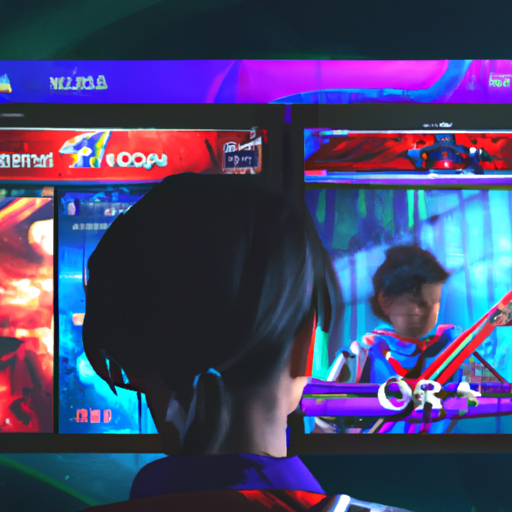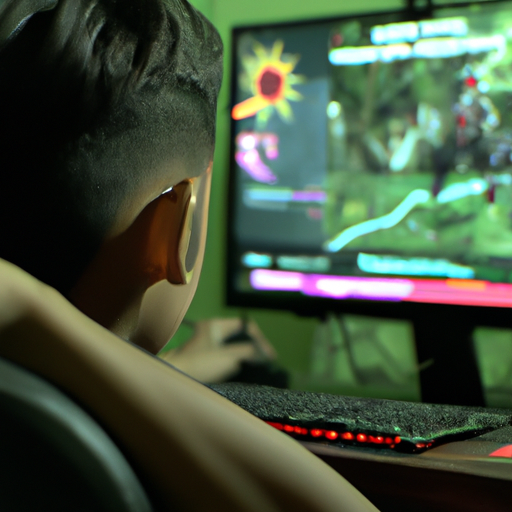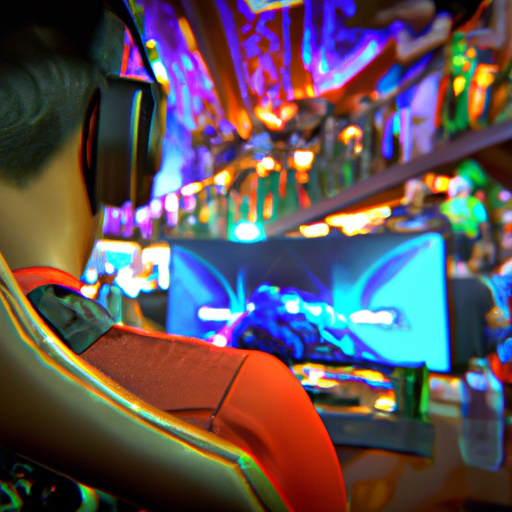Esports and Education: How Gaming is Changing the Learning Landscape in the Philippines

The Impact of Esports on Education in the Philippines
Esports, or competitive video gaming, has been gaining popularity worldwide in recent years. In the Philippines, it has become a cultural phenomenon, with millions of Filipinos tuning in to watch their favorite teams compete in international tournaments. But beyond entertainment, esports is also making an impact on education in the country.
One of the most significant ways esports is changing the learning landscape in the Philippines is through the establishment of esports programs in schools. Several universities and colleges have started offering courses and degrees in esports management, game design, and other related fields. These programs aim to prepare students for careers in the growing esports industry, which is projected to reach a global market value of $1.5 billion by 2023.
Moreover, esports is also being used as a tool to enhance learning outcomes in traditional subjects such as science, technology, engineering, and mathematics (STEM). In a study conducted by the University of the Philippines, it was found that students who played esports games showed improved problem-solving skills, critical thinking, and decision-making abilities. These skills are essential in STEM fields, where students need to analyze complex data and come up with innovative solutions.
Esports is also being used to promote teamwork and collaboration among students. In team-based games, players need to communicate effectively, coordinate their actions, and work towards a common goal. These skills are transferable to real-life situations, where teamwork is essential in achieving success. By incorporating esports into the curriculum, schools can help students develop these skills and prepare them for the workforce.
Another way esports is changing education in the Philippines is through the creation of esports leagues and tournaments for students. These events provide a platform for students to showcase their skills and compete against their peers from other schools. It also promotes sportsmanship, discipline, and fair play, which are essential values in any competitive sport.
Esports is also being used to address social issues in the Philippines. In a country where poverty and inequality are prevalent, esports provides an opportunity for underprivileged youth to showcase their talents and potentially earn a living in the industry. Several organizations have started offering esports training programs for disadvantaged youth, providing them with the skills and knowledge needed to succeed in the industry.
However, despite the potential benefits of esports in education, there are also concerns about its impact on students’ health and well-being. Excessive gaming can lead to addiction, sleep deprivation, and other health problems. Schools need to ensure that esports programs are balanced with physical activities and other extracurricular activities to promote a healthy lifestyle.
In conclusion, esports is changing the learning landscape in the Philippines in various ways. It is providing students with new opportunities to develop skills and prepare for careers in the growing esports industry. It is also being used to enhance learning outcomes in traditional subjects and promote teamwork and collaboration among students. However, schools need to ensure that esports programs are balanced with physical activities and other extracurricular activities to promote a healthy lifestyle. With proper guidance and support, esports can be a valuable tool in education and help prepare students for the challenges of the future.
Esports Betting in the Philippines: Opportunities and Challenges

Esports and Education: How Gaming is Changing the Learning Landscape in the Philippines
Esports, or competitive video gaming, has been gaining popularity worldwide in recent years. In the Philippines, the industry has been growing rapidly, with more and more gamers and enthusiasts joining the scene. However, esports is not just about entertainment and competition. It has also been making an impact on education, changing the learning landscape in the country.
One of the ways esports is changing education in the Philippines is through the integration of gaming into the curriculum. Some schools have started incorporating esports into their programs, recognizing its potential to enhance students’ skills and knowledge. For instance, some schools have introduced esports as a subject, teaching students about the history, culture, and business of gaming. Others have integrated gaming into their STEM (Science, Technology, Engineering, and Mathematics) programs, using it as a tool to teach coding, programming, and other technical skills.
Moreover, esports has also been used as a platform for promoting teamwork, leadership, and communication skills among students. Many schools have formed esports teams, allowing students to compete against other schools and participate in tournaments. Through these activities, students learn how to work together, communicate effectively, and develop leadership skills. They also learn how to manage their time, prioritize tasks, and handle pressure, which are essential skills in both gaming and real-life situations.
However, the rise of esports in the Philippines has also brought about challenges, particularly in the area of esports betting. Esports betting is the act of placing bets on the outcome of esports matches, similar to traditional sports betting. While it is legal in some countries, it is still largely unregulated in the Philippines, which has led to concerns about its impact on the industry and the players.
One of the main challenges of esports betting is its potential to promote gambling addiction among players and fans. Esports betting can be addictive, and some players and fans may become too focused on winning bets rather than enjoying the game itself. This can lead to financial problems, mental health issues, and other negative consequences.
Another challenge of esports betting is its potential to promote match-fixing and cheating. Since esports betting involves money, some players and teams may be tempted to manipulate the outcome of matches to win bets. This can undermine the integrity of the game and damage the reputation of the industry.
To address these challenges, the Philippine government and the esports industry have been working together to regulate esports betting and promote responsible gaming. The government has been drafting laws and regulations to ensure that esports betting is conducted in a fair and transparent manner. The industry, on the other hand, has been promoting responsible gaming practices, such as setting limits on bets and providing support for players and fans who may be struggling with addiction.
In conclusion, esports is changing the learning landscape in the Philippines, offering new opportunities for students to develop their skills and knowledge. However, the rise of esports betting also poses challenges that need to be addressed to ensure the sustainability and integrity of the industry. By working together, the government and the esports industry can create a safe and responsible gaming environment that benefits everyone involved.
Integrating Esports into the Curriculum: A New Approach to Learning in the Philippines
Esports and Education: How Gaming is Changing the Learning Landscape in the Philippines
The world of gaming has come a long way since the days of Pong and Space Invaders. Today, gaming is a multi-billion dollar industry that has captured the hearts and minds of millions of people around the world. In the Philippines, gaming has become more than just a pastime. It has become a tool for education.
Integrating Esports into the Curriculum: A New Approach to Learning in the Philippines
Esports, or competitive video gaming, has become a popular activity among young people in the Philippines. It has also become a way for educators to engage students in the classroom. By integrating esports into the curriculum, educators are able to create a new approach to learning that is both fun and effective.
One of the ways that esports is being integrated into the curriculum is through the use of gaming tournaments. Schools and universities are hosting esports tournaments that allow students to compete against each other in games like League of Legends, Dota 2, and Counter-Strike: Global Offensive. These tournaments not only provide students with a fun and competitive environment, but they also teach valuable skills like teamwork, communication, and problem-solving.
Another way that esports is being integrated into the curriculum is through the creation of esports clubs. These clubs provide students with a space to come together and play games, as well as learn about the industry and the various careers that are available in esports. By joining an esports club, students are able to develop their skills and knowledge in a supportive and collaborative environment.
Esports is also being used as a tool for teaching STEM (Science, Technology, Engineering, and Math) subjects. Games like Minecraft and Kerbal Space Program are being used to teach students about coding, physics, and engineering. By using games to teach these subjects, educators are able to make learning more engaging and interactive.
The Benefits of Integrating Esports into the Curriculum
Integrating esports into the curriculum has a number of benefits for both students and educators. For students, esports provides a fun and engaging way to learn new skills and develop their knowledge. It also helps to foster a sense of community and teamwork among students.
For educators, esports provides a new approach to teaching that is both effective and innovative. It allows educators to engage students in a way that is relevant to their interests and passions. It also helps to create a more dynamic and interactive learning environment.
The Future of Esports in Education
The integration of esports into the curriculum is still in its early stages, but it has already shown great promise. As the esports industry continues to grow, it is likely that we will see more and more schools and universities incorporating esports into their programs.
In the future, we may even see esports become a recognized academic discipline. Already, there are universities in the United States that offer esports scholarships and degree programs. It is possible that we may see similar programs emerge in the Philippines in the coming years.
Conclusion
Esports is changing the learning landscape in the Philippines. By integrating esports into the curriculum, educators are able to create a new approach to learning that is both fun and effective. Esports provides students with a way to develop valuable skills like teamwork, communication, and problem-solving, while also fostering a sense of community and collaboration. As the esports industry continues to grow, it is likely that we will see more and more schools and universities incorporating esports into their programs, and we may even see esports become a recognized academic discipline.





